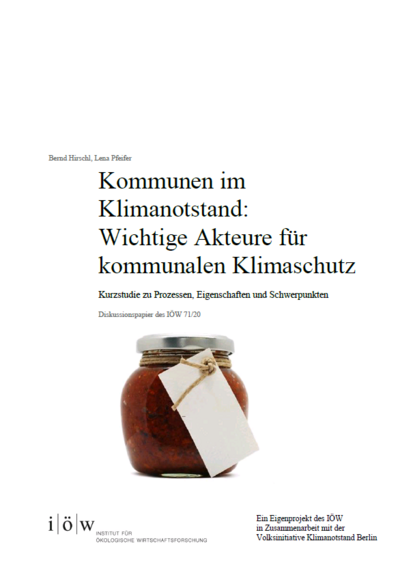Municipalities in Climate Emergency: New Actors for Local Climate Protection Brief Study on Processes, Properties and Focuses
The declaration of a so-called climate emergency has by now become a worldwide movement on the part of local communities and municipalities, as well as state and regional governments, to acknowledge the urgent need for climate protection and accordingly initiate or increase measures and set goals to address the situation. On 2 May 2019, the City of Constance became the first German municipality to declare a climate emergency; by October 2019, almost 70 further municipalities had joined the effort, with many more to follow. The present, self-financed, empirical study by the IÖW is predicated on the proposition that we are now witnessing the awakening of a promising new stakeholder and means of engagement with respect to local climate protection policy. The results of the study are based on an online survey, which asked questions about the nature and type of these municipalities, the relevant actors and processes, as well as the key points of their climate emergency declarations.
As a result, it can be confirmed that a new sub-state actor has indeed emerged, one that for the most part has not yet been very active in this context, one that at the same time often finds itself facing a precarious budgetary situation. Clearly, this is not a luxury issue – a phenomenon of affluent municipalities, which as a rule are already disproportionately active in climate protection. The observed main drivers with regard to these emergency declarations are external pressures (particularly the “Fridays for Future” movement) in combination with committed local politicians and administrative actors. Although many of these communal declarations have a rather soft character, a significant number of concrete and more fully developed climate protection resolutions have been included or are being planned. These declarations are thus much more than mere symbolism, even though many of them do not yet necessarily take the form of binding resolutions. Some elements – such as the mandatory review of all municipal measures for their climate impact (sometimes referred to as a climate reservation) in connection with a broad monitoring system – are of a caliber such that they can make an important contribution – in particular, to the mainstreaming of the climate change issue. Thus, from the authors' point of view, these municipal climate emergency declarations are also of interest with respect to national climate protection policies, and should therefore be supported, both structurally and by means of targeted funding.



